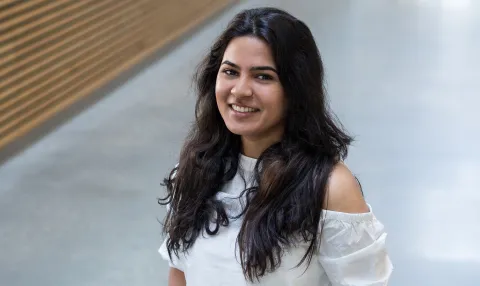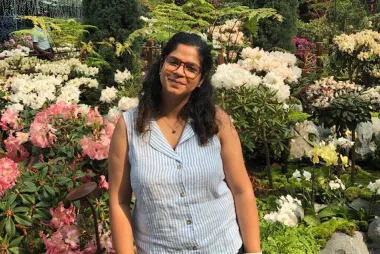“I believe with the help of this program, I have a fair understanding of the interdependence of architecture and landscape architecture for a better livelihood.”

Chaitrali Salvi
- Degree:
- Master of Landscape Architecture
- Grad year: 2018
- Program:
- Campus: Vancouver
Prior to my Master of Landscape Architecture I received a Bachelor of Architecture in Mumbai. Due to my affinity towards the field of landscape, I worked in a landscape design firm for a couple of years, contributing to a variety of landscape projects. My passion for landscape architecture grew stronger and therefore I decided to enroll in the Master of Landscape Architecture at UBC. I feel incredibly fortunate for the support received from my family and for the great opportunities I’ve had as a result of getting involved with my peers, professors and field professionals at UBC.
Why did you choose landscape architecture?
I grew up in a composite city where the landscape is defined by its people. I acknowledged it quite often, either during my daily commute or while wandering around the streets, sketching and photographing. The change in landscape was evident each time, such places with kinetics and transformative nature have always fascinated me. This lead to my interest in city landscapes, which was deepened with a work experience prior to joining the landscape architecture program. I worked on projects that focused on various aspects of cityscapes and more importantly landscapes. My favorite project was based on upgrading a city street. The scope was to establish interaction between city and people by curating experiences with small plazas, planting strategies and interesting landscape detailing. A fair amount of professional exposure was a deciding factor in choosing this field as my graduate program.
Where do you find your inspiration?
I find inspiration in people and their opinions about the landscape. My belief is that landscapes are narrated based on the way we observe and experience the landscape around us. Some may love it and some may loathe it, but it is interesting to analyze the variables and response people have to it. My desire has always been to analyze this behavior to curate places for people. I took up one such opportunity while researching on human perceptions with my thesis on NIMBYism (Not in My Backyard) against wind farm landscapes. The goal was to introduce a perspective to acknowledge and experience a twenty-first-century wind farm landscape which often remains silent in the background due to local opposition. It began with online research followed by a site visit to the wind farm facility. The visit enabled me to interact with nearby city residents, energy professionals and city planners from the same county to gather their point of views. It was an exciting experience to test how socio-cultural and environmental programming can confront people to large-scale energy landscapes.
How do you feel a graduate degree in landscape architecture has benefitted you compared to another field of study?
This program is a reinforcement to my previous degree in architecture where my focus was mostly on built-up forms, structures and construction. The element that seemed missed while designing architecture was the environmental and place-making qualities. This gap was bridged by the landscape architecture program. I believe with the help of this program, I have a fair understanding of the interdependence of architecture and landscape architecture for a better livelihood.
What has made your time at UBC the most memorable?
This being my first international travel, every moment spent on campus and around has been an experience. Starting from understanding the western culture and plunging into it by getting out of my own comfort zone was an exciting challenge. However, my peers and friends were a real comfort. Academically, this program has a student-oriented and interactive approach, which definitely helped me to build up ideas, explore my passion and sharpen my skills. The challenging opportunities, varying from a teaching assistantship to studio workshops and a summer internship, helped me to build better interaction with professors and professionals. Indeed, it was a pleasure discussing my design interests with the professors and other professionals who helped me to direct my graduate project above the mark. Each and every term has been full of exciting events and memories to cherish.
How will you go on to make a difference in the world?
Being an architect, I want to use my skills to address the possibilities of engaging people with the large-scale infrastructural landscapes. Such landscapes are a current and a future necessity; perhaps there is less awareness about their cultural potential. There is an ongoing independent research by planners, ecologists and artists about ways to make turbine landscapes visually appealing and environmentally sound. I think there is a need for comprehensive understanding which lies under the scope of landscape architecture. To my understanding, the field of landscape architecture responds equally to all the aspects mentioned above. I want to continue building upon my graduate project research and design to speculate on the opportunities these landscapes hold — it may not make a huge impact initially, but it's worth making a move.


